- Home
- Theodore Taylor
Into the Wind: The Odyssey of Ben O'Neal Page 2
Into the Wind: The Odyssey of Ben O'Neal Read online
Page 2
Inside the depot, I looked around, peered up at the high ceiling, gandered all the people going in different directions, not quite certain what to do next. Then, remembering that Reuben had said there was a place called Sailor's Bethany in Norfolk where you could get sleep for thirty cents a night, I prepared to make inquiry on how to get there, when up walked that insolent apple seller from the train.
"You lost?" he asked.
I came very near saying toughly, "Mind your own Yankee business," but my knees were on the verge of knocking. So I replied, "I'd like to get to Sailor's Bethany. It's somewhere here. Maybe down on the waterfro-ont." Of all miserable luck, my voice squeaked again.
The boy stood there lordly and cocked his head over. "Tar Heel, you been to sea so many times you ought to find it easy." The green eyes prodded.
Plainly, I had two choices. Tell him the gospel truth or wander around stupidly asking other people. Again looking at him straight, I admitted, "First time on a train; first time to sea, if I can get there." I felt vast relief.
The boy grinned and pushed back his Atlantic News Company hat. "First time away from home, too, I figure. Name's Michael Grant." He shoved his hand out.
He was friendly, after all, I thought, quite surprised. "Mine's Ben O'Neal. I'm from down Hatteras way." His thin hand was firm and just as friendly. I had misjudged the Yankee boy.
"Wherever you're from, you don't want to stay at Sailors Bethany. Despite all the soul-savin', too many drunks there every night. Tomorrow morning you won't have that seabag, either. Maybe not your shoes."
"My older brother stayed there."
"How old's he?"
"Twenty-four."
"How old are you?"
There was no sense in carrying on the lie at this point. "Thirteen."
"Ben, you got a lot to learn about cities. Those men might not tamper with your big brother, but they'll backhand you quicker'n look at you. I should know. I've rescued a dozen like you. I been drummin' two years."
"Drummin'?"
"Sellin' on these trains. I been to Norfolk a hundred times."
I could not hide my curiosity. "How old are you, Mike?"
"Sixteen come May."
Yet he seemed much older, now that we were talking about something other than overpriced apples. "All right, where should I go?"
"Come to a safe place. My boardinghouse. Mrs. Crowe's. I sleep there overnight, and keep my street clothes in a closet when I don't."
"How much does she charge?"
"Sixty-five cents a night, including breakfast and supper."
"I can't afford that," I protested. Me and Mama had lived on five dollars a month in the house near Heron Head. My fund, which was already damaged by the railway fare, would be gone in three weeks at those outrageous prices.
"There're lice-ridden places here you can get a bed for fifteen cents, but watch they don't slit your throat during the night. Besides, you got to buy all your meals extra."
All this talk about getting backhanded and slit-throated was unnerving. "I guess I better go with you."
We walked out to East Main Street and headed for midtown. Buildings were jawbone to jawbone, some five stories high. Trolley tracks were in the middle of the street. Horse wagons jangled by. People moved along the sidewalk like schooled fish.
Mike wagged his head to one side. "Chinese places."
HOP SING & COMPANY SHING HONG YICK SAM I had never seen a Chinese, dead or alive, and looked into the window of Hop Sing, smelling herbs, making up my mind to come back and walk this street slowly.
"This is purely the biggest street I ever saw," I confessed, craning my head, almost stumbling several times. The signs alone were enough to stop a person: MUTUAL LIFE INSURANCE OF NEW YORK WESTERN UNION TELEGRAPH COMPANY POCOMOKE GUANO COMPANY COLUMBIA TYPEWRITER COMPANY FEREBEE, JONES & COMPANY, AGENTS FOR KNOX HATS.
To think all these things were going on less than two hundred miles from Chicky Dock.
NORFOLK CONSERVATORY OF MUSIC NORFOLK SHAVING PARLOR HEPTASOPHIAN HALL, whatever that was.
"Has to be the biggest street in the world," I said.
Mike shook his head. "Only seventy-one miles of streets in this town. Some made of Belgian blocks, some cobblestone, some brick. Some just ground oyster shells. Wait'll you see Philadelphia and New York. This is a hick town."
Hick town? He should visit Whalebone, North Carolina.
A trolley came ringing by, spraying sparks, and I almost fell into the gutter, trying to walk backward and watch it.
Mike smiled. "Stay around here long enough and you'll see some steam automobiles."
"Automobiles?" Impossible.
"Run on banana oil. Electric trucks, too."
I couldn't wait to see them. "You from New York, Mike?"
"No, Scranton. That's in Pennsylvania."
Thankfully, he wasn't from Baltimore, which Filene had said was full of criminals. But he was solid Yankee, all right, though he seemed to be a nice enough one. They had played hod down toward Hatteras during the war, cutting timber as if they owned it, and were still unwelcome south of Moyock. If anything, I was solid Confederate, and Robert E. Lee, not General Grant, was my idea of a hero. But bygones had to be bygones.
As we walked on, I listened to the city. There seemed to be constant harsh noise in the streets, so different from the Banks. Far off, I could hear the yallowing of steamships and tug whistles in the river reaches, and I noticed the smells. Food and coal smoke and fertilizer and tar and creosote and roasting coffee beans. Pleasing antiseptic smells that pushed out of open doors alongside windows edged in brass. Robert Holmes, Druggist, was at No. 196, with a white tile floor; selling medicines, toilet articles, and Whitman's Fine Candies; advertising a new Tuff Revier double-stand soda-water fountain of solid onyx and overhead wooden-paddle electric fans.
All of it was overwhelming.
We made headway up on Main, then twisted and turned and soon arrived at a tall white house that was on a lane off a street called Granby.
4
SURROUNDED BY STRANGERS, I felt somewhat ill at ease at supper and ate mostly in silence, sitting by Mike Grant, listening and looking nonetheless. Red-haired Mrs. Crowe, who said she usually had no truck with riffraff from the sea, though she made an exception in my case, was rather small and quick; peppery of speech and sharp of light blue eye, independent enough for a widow of forty-five left with a fourteen-room house and not much else. Most of her middle-aged boarders were talkative railroad men, as had been her late husband, I soon learned.
I also quickly discovered that Mrs. Crowe, a dedicated Baptist, had a certain reputation in downtown Norfolk. Prominent member of the local Woman's Christian Temperance Union, she often burst into East Main Street saloons to kneel by the bar and shout, "Deliver them from Satan." When she was really stirred up, she broke bottles and poured the poison into spittoons.
She also had her rigid rules in the narrow four-story house fronted by a nice porch with scrollwork and round supporting posties, lined with six green rocking chairs. The rules were posted in every room and I read them, but none applied to me, of course.
WHISKEY BREATH IS STRICTLY PROHIBITED.
NO BEDROOM SLIPPERS ALLOWED IN THE DINING ROOM.
NO FEMALE BOARDERS (BECAUSE THEY WASH THEIR BLOOMERS AND HANG THEM OUT THE WINDOW).
NO PETS.
CIGARS AND PIPES PERMITTED AFTER DESSERT. NO ASHES IN THE FERNERY.
NO SMOKING IN BED.
So far as housekeeping goes, in a way she reminded me of fussbudgety Filene Midgett. She presided like a banty peacock at the table of nine that cool, clear evening over platters of ham hocks and new potatoes, fried lightly; bowls of black-eyed peas, and a warmer of buttermilk biscuits.
The talk was railroad talk, and I had never heard it before. High-wheeled Atlantic locomotives and air brakes and automatic couplers. No. 999 had pulled the Empire State Express at more than a hundred miles an hour in '93, and there was no reason not to get that kind of engine o
n the Norfolk & Western tracks and pull hotshot freights, said Mr. Stone, brakeman on a coal train.
"Shush, Mr. Stone," ordered Mrs. Crowe to the bald, big-jowled man who wore lavender galluses. "I want to talk to this innocent boy."
My mind was already weary from the wear and tear of the day, but Mrs. Crowe was never to be denied.
"Now, I say you'd be much better off going to work in the N&W machine shop out at Lambert's Point. They hire apprentices and treat them well. In five years you can be running a lathe or making molds. Earn a decent living without the temptations of the sea."
They were all waiting for my answer, looking at me. Finally, I explained, "I have to go to sea, ma'am."
"And who is forcing you to do that?"
"I expect I am," I replied, as earnestly as I could. "It's in my family blood."
"You should drain it out."
The railroad men laughed.
"I can't, ma'am."
In fact, it was Reuben who had talked about that glorious moment when the last line separates from the dock and the ship becomes a world of its own; that moment when it lifts on the first ocean swell, outbound. "I just can't do it," I repeated.
Mrs. Crowe let out an exasperated sigh and tapped a fork by her plate in annoyance. She did not like to be overruled. "Well, if you must go on and expose yourself to the most wicked people on earth, you go to J. M. Jordan's in the morning and tell him Ethel Crowe sent you. He's a fine Christian man, honest as a creek pebble, and won't steer you to a hellship."
J. M. Jordan's. I nodded gratefully. I'd heard of Jordan's, the foremost ship chandlers. They provisioned vessels, supplying food and all manner of things.
"Moreover, I suppose you'll enjoy listening to sea stories around his Heatrola, hot or cold, though I wouldn't give a whit for a sea story. Sailors are all terrible liars as well as drunks. But all the best captains come to Jordan's, over Oscar Smith or D. S. Baum."
Reuben had mentioned Jordan's, and that Heatrola, a big, barrel-like stove, come to think of it. I thanked her kindly.
Mrs. Crowe then nodded permission to Mr. Stone, who resumed his discussion of fast locomotives to pull hotshot freights on the N&W line.
After dessert, of hot peach dumplings doused with thick cream, Mrs. Crowe cleared the table, served coffee, opened the windows to let smoke out, and retired to the kitchen with a curt warning to drop no ashes on the parlor rug and a reminder to me to "think about it."
"I will, ma'am," I promised.
Twilight had spread over the port.
Red and green running lights, white mast lights, were moving around the branches of the Elizabeth River, hulls almost hidden in the gloom, though the ship whistles and tugboat toots from the harbor were not as frequent now.
Six bells, seven o'clock, was rung down on the ships as Mike and I paused briefly on the fourth-floor landing, which had a wide window affording a good view.
"That's Portsmouth over there, and the ferries dock here at the foot of Commercial. Those are the Merchant & Miner docks down there. Old Bay Line. Over there is the naval hospital."
Paddle-wheel ferries, their walking beams rocking like steel seesaws, churned the water between Portsmouth and Commercial Street. Small boats crisscrossed the wakes, bucking and plunging. Almost dead ahead of us, a white vessel, aglow in every window and port, moved slowly upriver.
"She's from the nations capital. Norfolk & Washington Steamboat Company. They dock at the foot of Water."
She blew hoarsely as a small oyster dredger crossed her bow.
Ah, the life in a bustling port city, I thought, my feet almost floating up with contentment. On the morrow there go I, were my thoughts.
In the room, Mike settled down and lit up a white clay pipe, giving me the notion that I might possibly want to spend some money on a pipe and sack of tobacco. It would make me seem older, I concluded. With my lifelong companions on the Banks, Kilbie Oden and Frank Scarborough, I had tried tobacco, both the shredded kind and chewing plug, with not much instant pleasure and some later illness. Yet sitting there and puffing, Mike looked very mature.
"Sure you don't want to think about that N&W machine shop? Mrs. Crowe knows the foreman."
I shook my head. "Made up my mind this morning on the Neuse to try and find Reuben down in the Caribbean. He's my big brother, mate on a brig running between Trinidad, the Barbadoes, and Port Fernandino. That's in Florida. He doesn't even know Mama's dead."
"No one else left in your family except him?"
"Not a soul. Papa died a long time ago. Then brother Guthrie. Mama died last month."
Smoke rose and eddied into Mike's blond hair as he turned solemn and thoughtful. "My old man just as well be dead. He gets paid noontime Saturday an' drinks till sundown Sunday. He used to beat up on all of us. That's mainly why I left home. Worked as kitchen boy at the Vanderbilt in New York City first."
I shook my head sympathetically and sat down on the edge of the bed, hoping I could stay a while. "I never knew my papa."
Mike laughed hollowly. "I wish I'd never known mine."
That wasn't a nice thing to say and I wanted to change the subject but didn't do a very good job of it. "You ever get homesick?"
There was thick silence a moment. "Sometimes. I spent Christmas Day between New Bern and Lizzie City. Five passengers on that whole train. We slowed down for little towns and I could see people that morning in their front rooms opening their presents ... trees with candles on them..."
I suddenly felt sorry for this boy.
"You'll get that way, too, believe me," Mike said, green eyes warning. "It'll hit you when you least expect it. One thing, you can always go back home and no one will slap you or cuss you."
No one ever did that, I recalled. Never.
Mike went on with the distressing subject. "I can't remember when there wasn't meanness in my house. Even my brother and sister turned mean."
I could not remember a single time when Rachel O'Neal was really mean. Oh, she was cantankerous now and then; nagged now and then. Always jumpy about me going near the water. But never mean. "I guess I had a good house after all," I said, wishing we hadn't gotten onto this subject this particular evening.
"Lucky you didn't get born in mine," Mike said.
I told him about our house and a sand pony and dog I'd had, but he wouldn't talk about his house. He did mention his dog, Burnie, rescued from a stable fire. Not much else.
For a painful moment, a clear picture of our house, tucked at the end of a pathway in red myrtle, scrub holly, and live oak, popped into my mind. Then the faces of Mama, Filene, Jabez, Mark Jennette; Kilbie, Frank, and Mr. Burrus, even surly Hardie Miller, passed before me. I found myself getting clog-throated and said, "We knew everybody, just like family."
"Maybe you should have stayed on and waited for your brother."
What an untimely thing for him to say: I looked at him and struggled with that idea again, not that I hadn't been struggling with it since early morning. I pushed it back and tried to clear my mind. "But, stuck out on those Banks, sometimes I went crazy, Mike. You ever seen them?"
"Closest I ever got was Lizzie City."
"Sand and shipwrecks. Lifesaving stations. Not much else. No roads, no electricity, no chamber toilets. You could put Chicky village, Clarks, Buxton, and Hatteras in four square blocks of what I saw today."
Mike nodded. "I still might trade you for Scranton."
I blew a breath. "I don't know what got into me yesterday. I took a look around just before I left and it didn't look so bad..."
"Hmh," said Mike.
I hit the bedspread with the palm of my hand. "Tell me about trains, Mike..."
He did, but somehow we got back to Heron Head and, nearing ten o'clock, Mike said to me, "Well, Heron Head sounds a lot better'n Scranton."
That was hard to believe. "Yeah, but you're out of Scranton now, riding these trains every day. You been everywhere, New York and Philadelphia..."
He nodded but got up and went over t
o the window. When he turned back, I could not understand the look on his face. It seemed dark and empty. "I guess..." Then he walked back over and grasped the counterpane up by the pillow. "I'm tired of talking."
Just like an adult, I thought. Exactly like one.
"I'm sleepy, that's all, Ben," he said, an edge still in his voice.
"See you in the morning," I said, mystified by his change of mood, all clouded over in seconds.
"If you're up that early. I've got to be on the train by seven-thirty." He was very upset and wanted me out of there.
"I'll be up," I said, and wished him good night.
Closing the door behind me, I went on down the hall in puzzlement. What could I have said that annoyed him?
Clean and neat, my own room had fresh linen, along with a china washbowl and matching wash pitcher on a low, granite-topped bureau. By the bed was another small stand with a Bible on it, inscribed GIFT OF THE LADIES' RAILROAD AUXILIARY. Mrs. Ethel Crowe ran a good place indeed, and I would recommend it to anyone. Rachel O'Neal would have likely approved of this place, I thought. But, looking around, it was still a strange room, so different from my own.
I heard a trolley sound over on Granby. Bell clangs and a scrape of steel. Otherwise, there was almost complete silence. The men downstairs had gone to bed and I was sure Mrs. Crowe had donned her nightcap and creamed her face. Breakfast began at six.
I stood a moment longer, realizing it was the first evening I'd ever spent away from the Banks. There was no pound of surf, no cry of night birds. No familiar wand of warmth from Bodie Island Lighthouse. There was a different smell in this room. Nothing like the faint, damp pine odor of my own. Nothing was the same. Everything had changed overnight.
Suddenly I knew why Mike had become upset. There'd been love and warmth in our house. On those Banks, people cared for each other. I'd told him about something he could never have. No wonder he'd trade Scranton for Heron Head. I thought about him getting cussed and slapped....
In bed, I sighed and twisted around, thinking about Mike and about everything that had happened in the past months. The wreck of the Malta Empress. Teetoncey washing ashore, her parents drowning. The whole perplexing business with the silver bullion carried by the Empress.

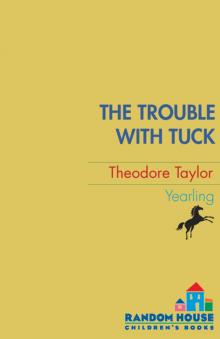 The Trouble With Tuck the Trouble With Tuck
The Trouble With Tuck the Trouble With Tuck The Bomb
The Bomb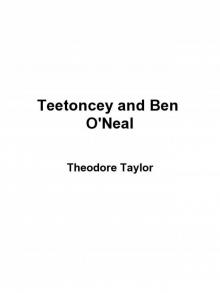 Teetoncey and Ben O'Neal
Teetoncey and Ben O'Neal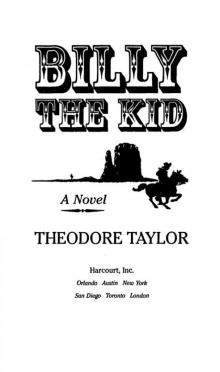 Billy the Kid
Billy the Kid Ice Drift
Ice Drift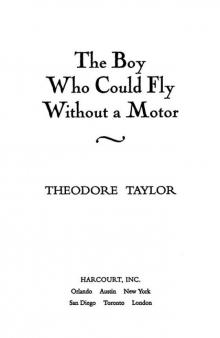 The Boy Who Could Fly Without a Motor
The Boy Who Could Fly Without a Motor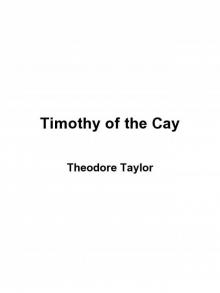 Timothy of the Cay
Timothy of the Cay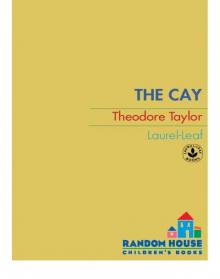 The Cay
The Cay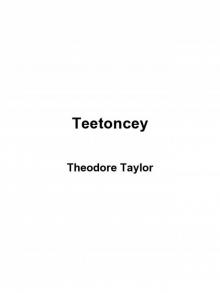 Teetoncey
Teetoncey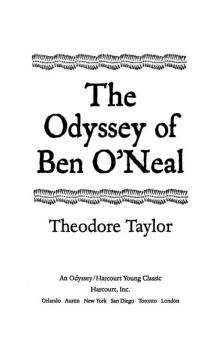 Into the Wind: The Odyssey of Ben O'Neal
Into the Wind: The Odyssey of Ben O'Neal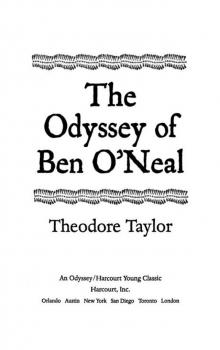 The Odyssey of Ben O'Neal
The Odyssey of Ben O'Neal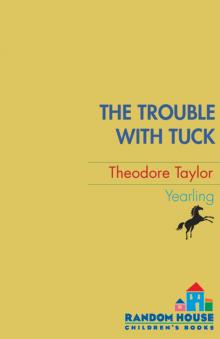 The Trouble with Tuck
The Trouble with Tuck